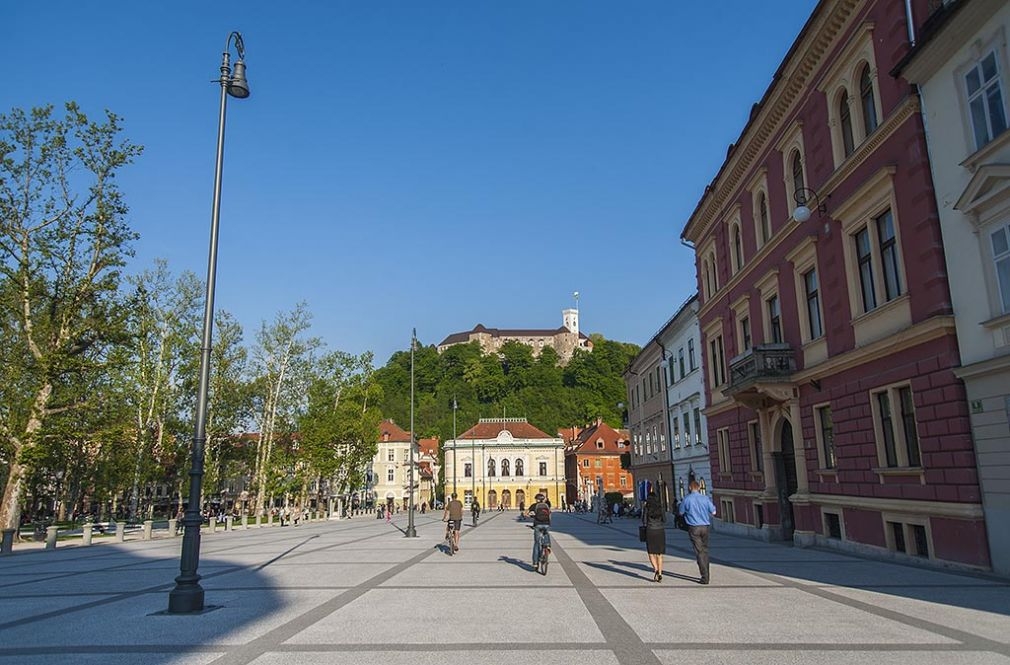Imagine our ancestors who would rise from the dead and see that Ljubljana has a lifelong mayor who does not consider Ljubljana as the Slovenian capital, but as the city of everybody. Additionally, on the streets of Ljubljana, as on Friday, they would see immigrants go wild, manage, provoke the police while shouting that this is “their city”. To them, it would appear that Ljubljana is no longer ours, Slovenian. While the gradual denationalization of Ljubljana has been laid in the cradle of our generation and we may not experience it as a tragedy, through the lenses of our ancestors this is defeat, a betrayal, a farewell. The Requiem for Ljubljana by the Slovenian poet Denis Poniž should be read in the spirit of our ancesters.
Denis Poniž, a Slovenian poet, was not the only one who was shocked, scared, disappointed, and sad when he watched the events on the streets of Ljubljana on Friday. But he was one of the few who decided to articulate his feelings on paper, which resulted in his Requiem for Ljubljana.
In his farewell to Ljubljana, Poniž writes that he was born and raised in Ljubljana and he also lived in the city for a long time, but that Ljubljana as he knew it, especially during his student years, no longer exists. He vividly describes Ljubljana from those times as “a city where he sometimes met acquaintances and friends, city specials, Jančar’s clever Honzas, artists of all calibers and provenances, scientists, and professors,”unlike today, when “the city is dominated by semi-literate newcomers from near and far who only have two things in common: the inability to use duality and their “business” which was (and still is) more or less criminal in nature.”
Burek and chevapcic culture
When he further describes the “new masters” of Ljubljana, once a Slovene city, he says that they can be seen in all possible “cafes” whose owners are connected to the aforementioned mayor (Zoran Jankovič) and his clique. They drive around the city in expensive German cars and blast songs by Balkan singers, who occasionally give concerts in the mayor’s mega project called Stožice, where the audience for whom settlements were built in Šiška, Stožice, Novi Fužine and Štepanjsko naselje, gathers.
Hostile to immigrants? Why? Is any of this not true? Do Slovenes go to the mentioned settlements to chant that they are “theirs”? Is it hostile if a local tells off a newcomer because he takes up more and more of his space? Poniž writes about Ljubljana with sadness, he writes about a city that once had a “Central European charm”, but today it is a “Balkan cesspit, full of chevapcics (grilled Balkan sausage) – cuisine and culture wise”.
Ljubljana is drowning in the mentality of “shepherds”
What shocks and angers him the most is that the Balkanization of Ljubljana – the fact that it is becoming more and more unsafe to walk in Ljubljana at night because of the “new Ljubljana residents” – is indirectly or even directly supported by Slovenian cultural figures, artists and intellectuals, who every now and then sign petitions against the government, Janez Janša, SDS, Nova24TV.
Poniž writes that Ljubljana, as a Slovene city, survived communist Yugoslavia, yet today it is less and less Slovene and more and more a reflection of a new immigrant (non-)culture. With sad words he concludes that these partially integrated, never assimilated descendants of immigrants are now “in charge” in Ljubljana also in the fields of “culture”. They are deniers of the authentic Central European cultural heritage, on which the Slovene nation formed and survived even during the most difficult times of the two World Wars, the civil fratricidal struggle, the communist revolution and other disasters of gigantic proportions”.
The Slovene nation, which “was naively convinced, especially in the first years after independence, that white Ljubljana, the city of Plečnik’s and Vurnik’s masterpieces, would remain its capital” witnessed how it instead “all transformed into yet another historical mistake…”
